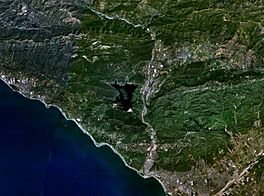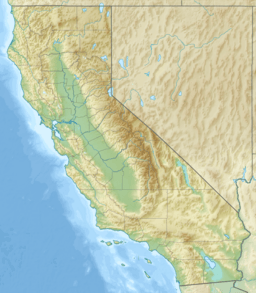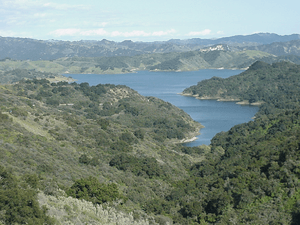Lake Casitas facts for kids
Quick facts for kids Lake Casitas |
|
|---|---|
 |
|
| Location | Ventura County, California, U.S. |
| Coordinates | 34°23′33″N 119°20′05″W / 34.3924°N 119.3346°W |
| Lake type | Reservoir |
| Primary inflows | Coyote Creek; Santa Ana Creek |
| Primary outflows | Coyote Creek |
| Catchment area | 39 sq mi (100 km2) |
| Basin countries | United States |
| Managing agency | Casitas Municipal Water District |
| Max. length | 3.3 mi (5.3 km) |
| Max. width | 1.9 mi (3 km) |
| Surface area | 1,100 acres (450 ha) |
| Max. depth | 240 feet (73 m) |
| Water volume | 254,000 acre⋅ft (313,000,000 m3) |
| Shore length1 | 32.4 miles (52.1 km) |
| Surface elevation | 338 ft (103 m) |
| Settlements | Oak View, Ojai |
| 1 Shore length is not a well-defined measure. | |
Lake Casitas is a large reservoir (which is like a man-made lake) located in Ventura County, California. It was built by the United States Bureau of Reclamation and finished in 1959. The main purpose of Lake Casitas is to provide clean drinking water for people and water for irrigation (watering crops). It also helps with flood control by holding back extra water during heavy rains.
A big dam called Casitas Dam was built on Coyote Creek to create the lake. Other smaller creeks, like Santa Ana Creek, also flow into it. The lake can hold a lot of water, about 254,000 acre⋅ft (313,000,000 m3). This dam is part of a bigger plan called the Ventura River Project.
Contents
History of Lake Casitas
Lake Casitas first filled up with water around the 1970s. The extra water flowed over its spillway for the first time in 1978. As of 2024, this has happened eight times.
Olympic Games Connection
Lake Casitas became famous during the 1984 Summer Olympics held in Los Angeles. It was chosen as the special place for the canoeing and rowing events. Athletes from all over the world competed here.
Impact of the Thomas Fire
At the end of 2017, a huge wildfire called the Thomas Fire burned a large area around the lake. This fire affected how the lake operates. When it rained after the fire, a lot of ash, dirt, and small rocks washed into the water system. This sometimes caused temporary shutdowns of the water supply from the Ventura River.
How Lake Casitas Works
The Casitas Municipal Water District manages Lake Casitas. They are in charge of providing drinking water to the Ojai Valley, parts of Ventura, and the Rincon coast. They bought the local water system in 2017 to take over this important job.
Water Supply
A special dam called the Robles Diversion Dam was built on the Ventura River in 1958. This dam helps move water through a four-and-a-half mile canal (about 7.2 kilometres) into Lake Casitas. About 30% to 40% of the water in Lake Casitas comes from the Ventura River, especially when the river flows strongly in winter.
Lake Rules for Safety
The Casitas Municipal Water District has rules about using the lake. People are not allowed to have direct body contact with the water. This means no swimming or wading. The main reason for this rule is that Lake Casitas is a source of drinking water. Keeping people out of the water helps keep it clean and safe for everyone to drink.
Even though swimming is not allowed, you can still enjoy many activities at the lake. Fishing, boating, rowing, and camping are all permitted.
The "no body contact" rule was put in place a long time ago, before the lake had a modern water filtration system. In the 1990s, the lake got a big upgrade with a new, advanced filtration system. A study looked into whether body contact could be allowed with the new system. The study found that the system was very good and could probably handle any extra pollution from people. However, the water district has decided to keep the "no body contact" rule to ensure the water remains as clean as possible for drinking.
Wildlife at Lake Casitas
Lake Casitas is home to some amazing wildlife. What is thought to be the only nesting pair of bald eagles on the mainland of Ventura County lives near the lake. They have a large nest in a eucalyptus tree. These majestic birds have successfully raised baby eagles in both 2022 and 2023.
 | Percy Lavon Julian |
 | Katherine Johnson |
 | George Washington Carver |
 | Annie Easley |




